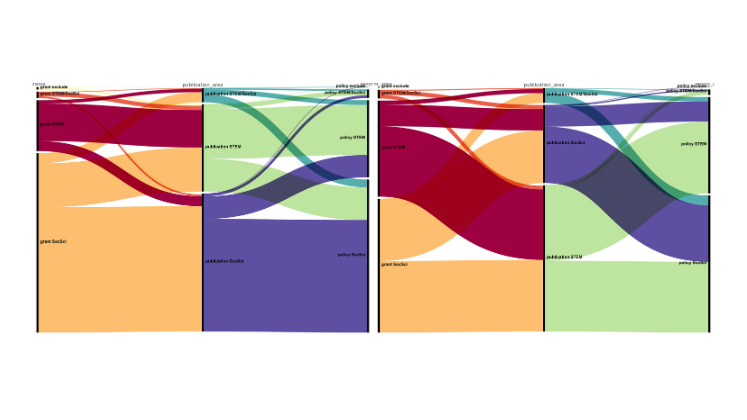In Understanding Humans: How Social Science Can Help Solve Our Problems, David Edmonds curates a selection of interviews with social science researchers covering the breadth of human life and society, from morality, bias and identity to kinship, inequality and justice. Accessible and engaging, the research discussed in the book illuminates the crucial role of social sciences in addressing contemporary societal challenges, writes Ulviyya Khalilova.
This blogpost originally appeared on LSE Review of Books. If you would like to contribute to the series, please contact the managing editor at lsereviewofbooks@lse.ac.uk.
Understanding Humans: How Social Science Can Help Solve Our Problems. David Edmonds. SAGE. 2023.
In the Social Science Bites podcast series, David Edmonds, a Consultant Researcher and Senior Research Associate at the Oxford Uehiro Centre for Practical Ethics, collaborated with Nigel Warburton to explore the dynamics of modern society, interviewing eminent social and behavioural scientists on different topics. The engaging discussions that resulted led Edmonds to curate a selection of the episodes in a written format to bring the research to new audiences. The resulting book, Understanding Humans: How Social Science Can Solve Our Problems, offers valuable insights into various aspects of human life and society, covering subjects from morality, bias and identity to kinship, inequality and justice.
Understanding Humans […] offers valuable insights into various aspects of human life and society, covering subjects from morality, bias and identity to kinship, inequality and justice.
In his foreword to the book, Edmonds highlights that the selection of interviews, which translate into different chapters, reflect his own interests, though the criteria for their inclusion remains undisclosed. The book consists of eighteen chapters split between five thematic sections titled, respectively: Identity, How We Think and Learn, Human Behaviour, Making Social Change, and Explaining the Present, and Unexpected. Some topics introduced in one section can also fit into others, leading to overlaps between certain sections.
In the section on Identity, Sam Friedman discusses the insufficiency of education to eliminate the influence of class privilege, while Janet Carsten talks about the interconnectedness of kinship with politics, work, and gender. In his discussion of class, Friedman states that despite educational attainments, class privilege still significantly impacts career progression. The level of autonomy in the workplace, alongside one’s position and salary, could indicate whether career success correlates with social class. Friedman suggests that societal beliefs in meritocracy often overlook the inherent class-related barriers that hinder individuals’ opportunities for career development.
In the next section, Daniel Kahneman, Mahzarin Banaji, Gurminder K. Bhambra, Jonathan Haidt, Jo Boaler, and Sasika Sassen discuss various aspects of human thinking and learning. In his chapter on bias, Kahneman sheds light on biases in human thinking, discussing the dual processes of thinking: fast, associative thinking (System 1) and slower, effortful control (System 2). System 2 assists us in providing reasoning or explanations for our conclusions, essentially aiding in articulating our feelings and emotions. Education enhances System 2 and develops rational thinking, although achieving absolute rationality remains an elusive goal.
Boaler challenges the myth of innate mathematical ability, highlighting the crucial role of active engagement in developing mathematical skills.
In her chapter on the “Fear of Mathematics,” Boaler challenges the myth of innate mathematical ability, highlighting the crucial role of active engagement in developing mathematical skills. Deep thinking is crucial for developing maths skills, but it is a slow process that requires time. There is also a need for reforms in maths education, particularly addressing the issue of timed assessments that impede the brain’s capacity to develop mathematical skills effectively. Boaler states that the purpose of mathematics shouldn’t glorify speed, considering that many proficient mathematicians acknowledge working at a slower pace.
In the chapter “Before Method,” Sassen discusses how prior experiences shape research approaches, introducing the concept of “before method”, referring to both the desire for conducting research in a particular way and the actual execution of a research study. The rationale behind selecting a specific research method and topic is connected with the pre-existing experience preceding the method itself. Sassen challenges established categories by questioning whether it is possible to perceive things without initially considering categories, potentially influencing the direction of the study. She acknowledges that her awareness of prior research studies, established categories, and personal life experiences significantly shape her perception of the world as a researcher.
Following this, Stephen Reicher, Robert Shiller, David Halpern, and Valerie Curtis talk about various facets of human behaviour. Reicher discusses group dynamics, elucidating how physical proximity and psychological commonality foster different groups. Reicher also posits that group boundaries are loose and attributes this to the social changes, which, according to his explanation, result from a we-they dichotomy. Understanding intergroup interactions is crucial, particularly when individuals might not wish to be associated with confrontational aspects. However, belonging to a specific group often leads to labelling individuals, linking all their actions with that group, despite the distinctive nature of their involvement.
Halpern in his chapter on nudging explains that humans are not solely rational beings; their behaviour is influenced by various factors including impulses and emotions.
Halpern in his chapter on nudging explains that humans are not solely rational beings; their behaviour is influenced by various factors including impulses and emotions. He elaborates on how nudging proves beneficial for jobseekers, where incorporating specific human-related elements in emails encourages them to attend interviews. Halpern also posits that our inherent ‘groupish’ tendencies are intricately linked to human psychology. Various factors influence our proximity or distance from others, ultimately affecting societal progress, including economic development. Trust, for instance, varies significantly among different social classes. An individual from an impoverished social class facing financial challenges tends to have lower social trust. Conversely, someone from an affluent background might experience the opposite due to their social circle being influenced by their wealth.
Chenoweth’s research highlights the efficacy of nonviolent political action when contrasted with violent approaches, emphasising its higher success rates and potential to facilitate democratic transitions.
In the section on “Making Social Change” Jennifer Richeson, Erica Chenoweth, and Alison Liebling discuss how employing various approaches and research methods can drive social changes. Chenoweth’s research highlights the efficacy of nonviolent political action when contrasted with violent approaches, emphasising its higher success rates and potential to facilitate democratic transitions. Within the political sphere, an emerging trend is the digital revolution, distinct in some aspects from other revolutions. Erica Chenoweth also states that the digital revolution might foster a misleading impression by mobilising thousands to march in the streets.
In the section “Explaining the Present and the Unexpected,” Hetan Shah discusses the impacts of the Covid-19 pandemic on social and economic spheres, while Bruce Hood talks about supernatural attitudes or beliefs. Shah elucidates how the pandemic has shifted societal norms and behaviour. He also draws attention to the impact of these norms on human behaviour and the potential for fostering a fair society. Examining the pandemic from multiple angles – medical, social, and economic – deepens our understanding of human behaviour Shah emphasises that social sciences play a crucial role in unveiling how biases shape our thoughts and actions, addressing the social problems.
[Understanding Humans] provides readers with a compelling overview of exceptional research studies on how we think and act as individuals, and the social, economic, educational and political structures that we operate within.
Overall, the eclectic chapters in ‘Understanding Humans: How Social Science Can Solve Our Problems’ illuminate the profound role of social sciences in exploring and addressing social issues. This book serves as a valuable resource for a broad audience, being accessible and engaging for readers without prior knowledge or expertise in the fields drawn upon by the researchers. It provides readers with a compelling overview of exceptional research studies on how we think and act as individuals, and the social, economic, educational and political structures that we operate within.
The content generated on this blog is for information purposes only. This Article gives the views and opinions of the authors and does not reflect the views and opinions of the Impact of Social Science blog (the blog), nor of the London School of Economics and Political Science. Please review our comments policy if you have any concerns on posting a comment below.
Image Credit: tadamichi on Shutterstock.







